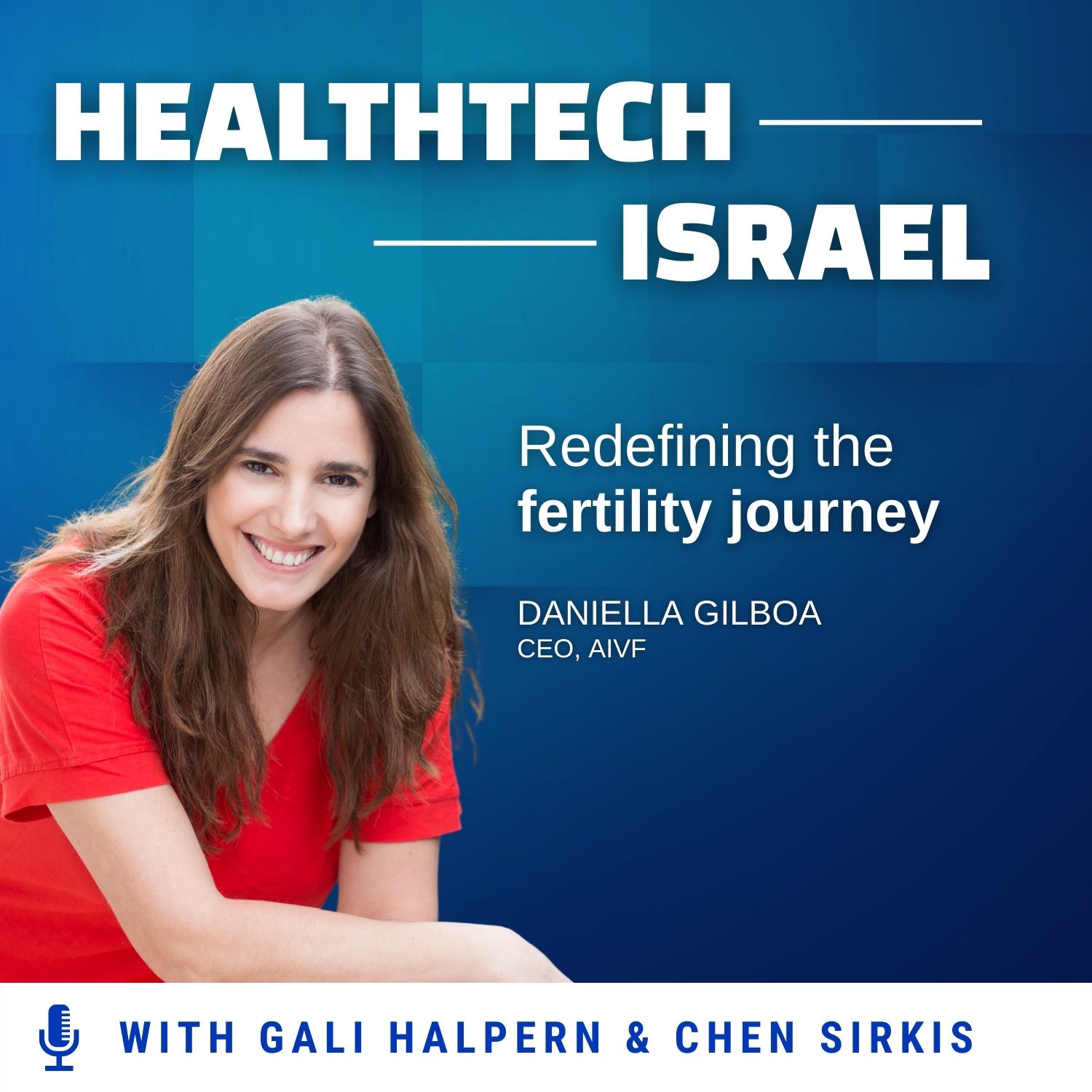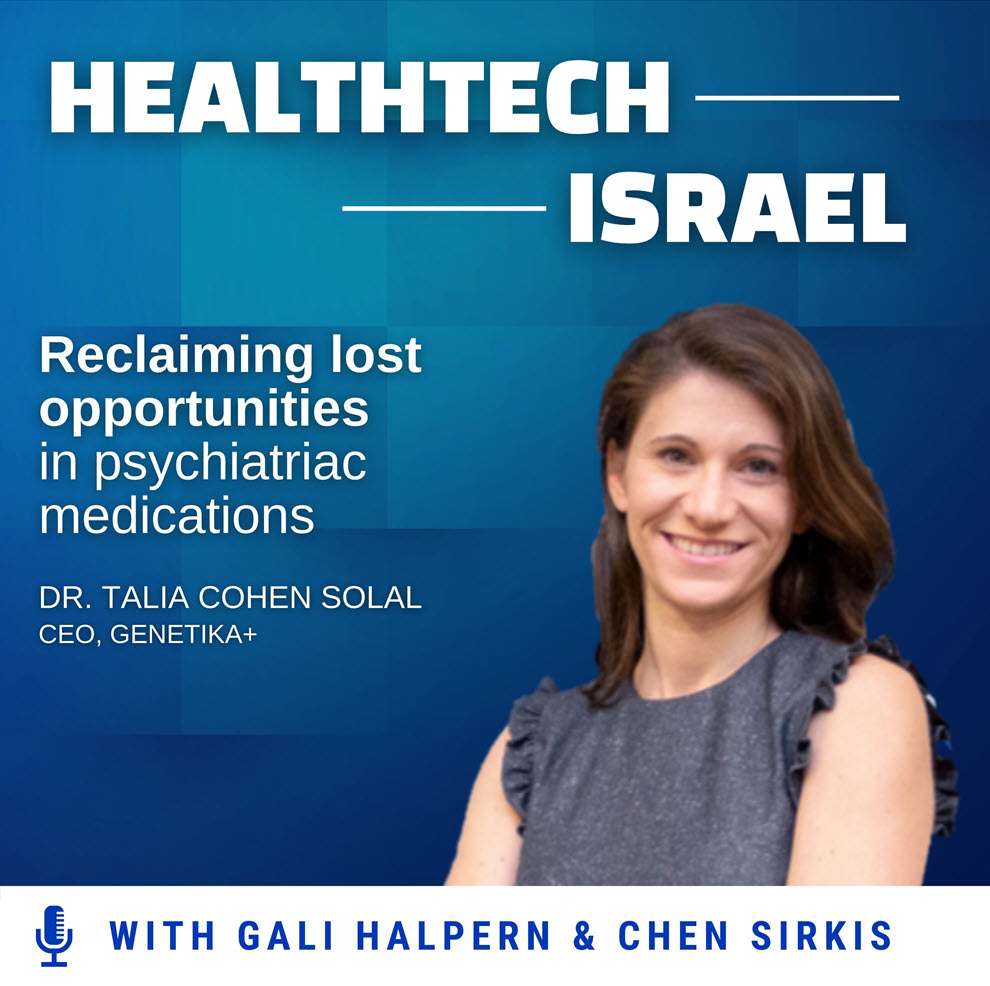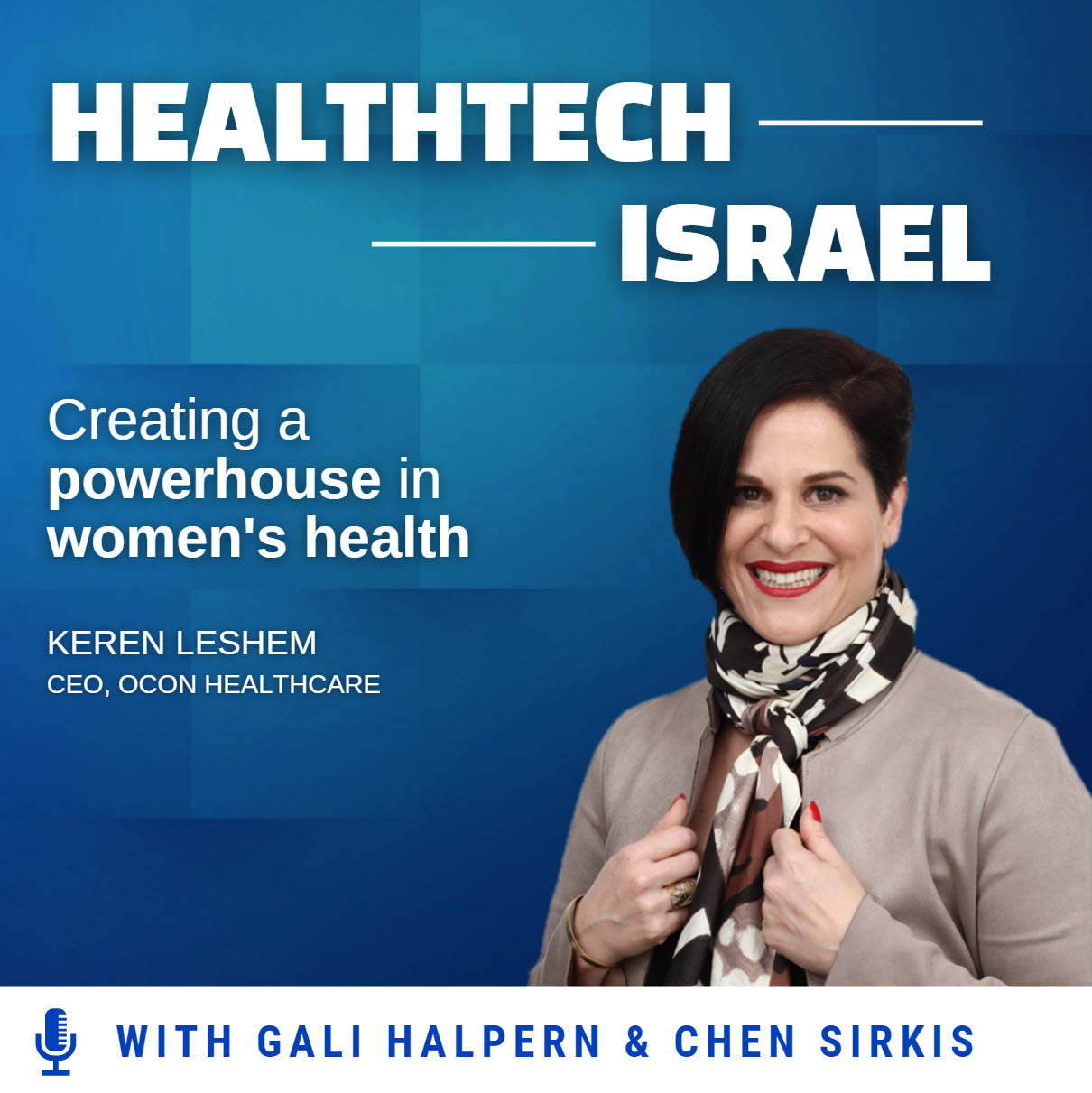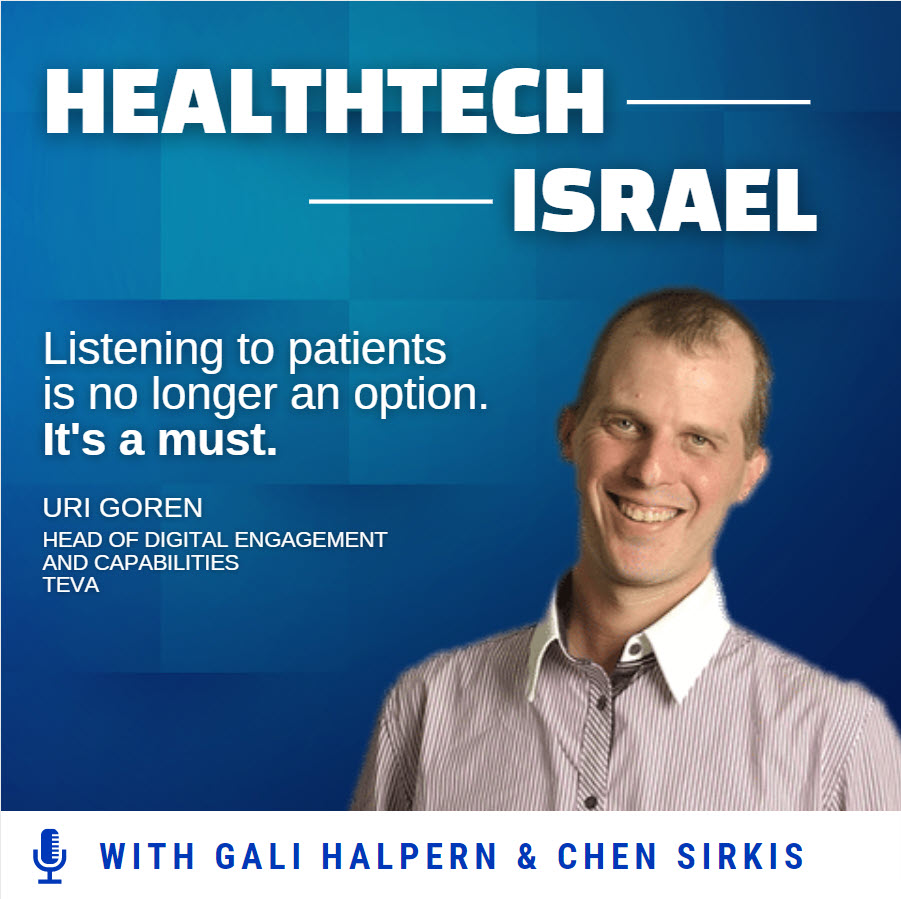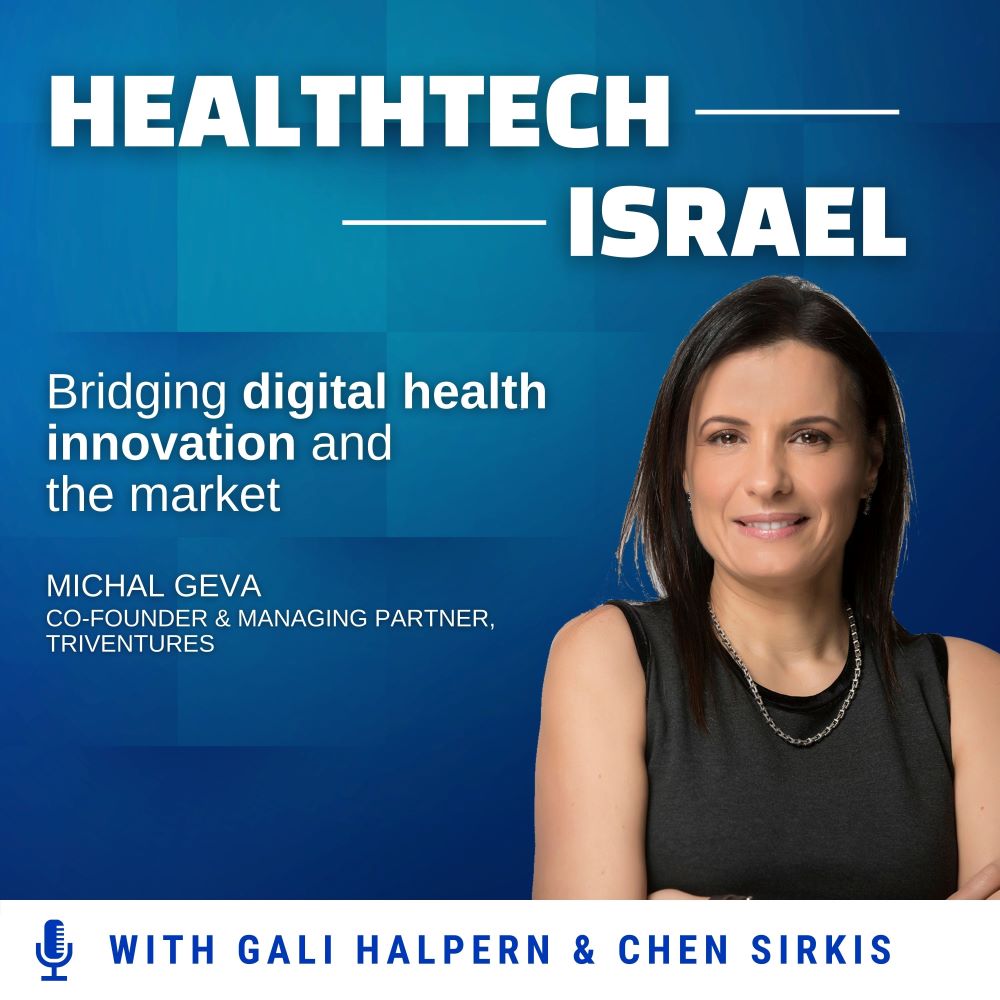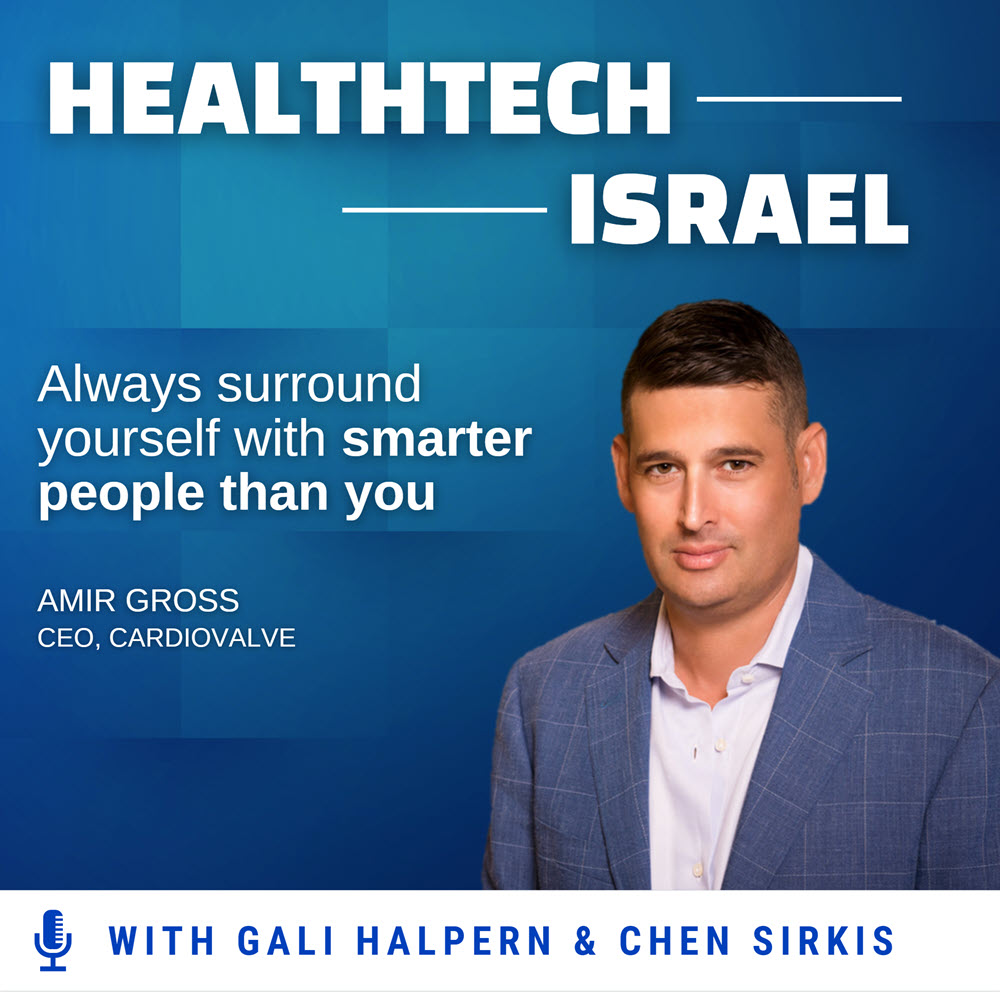Dedi Gilad
CEO, Tytocare
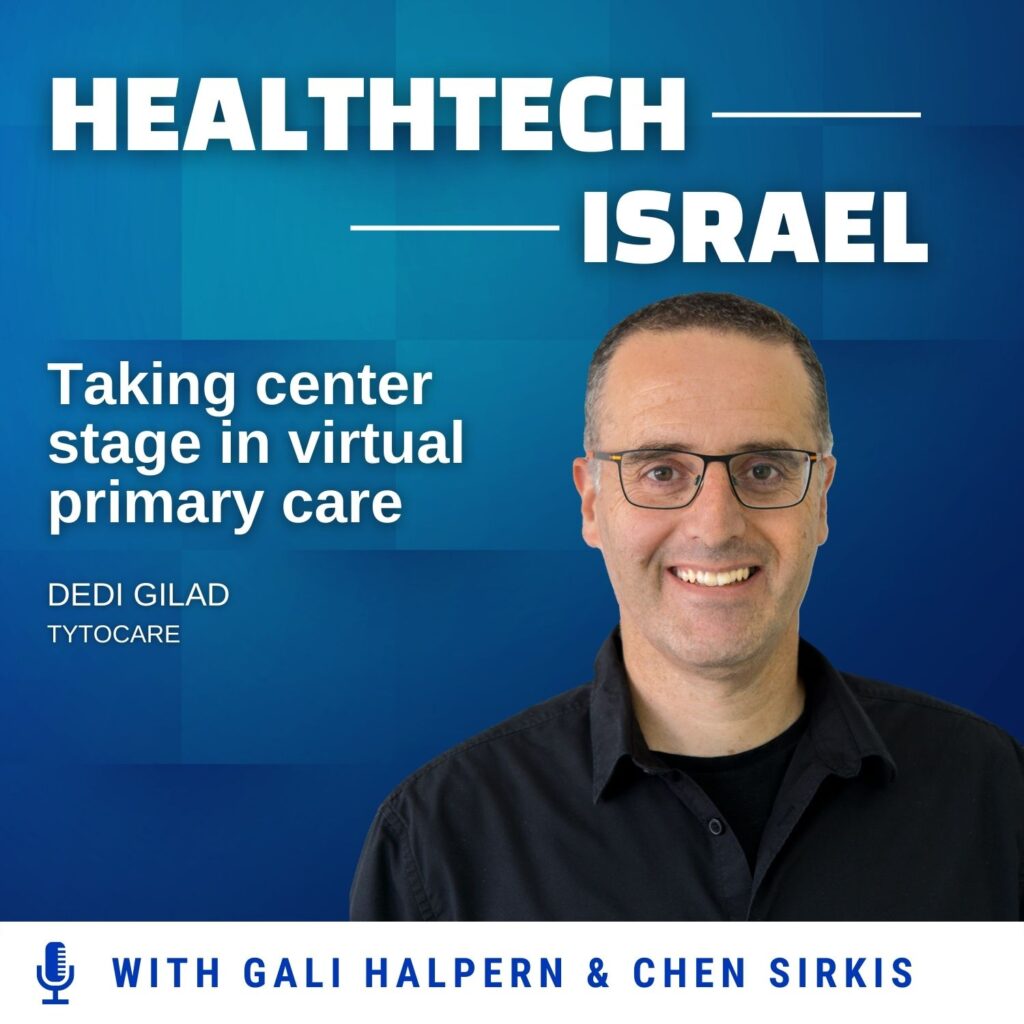
Dedi Gilad is the CEO of TytoCare, the healthcare industry’s first all-in-one modular telehealth device and AI-powered platform for on-demand remote medical exams and visits.
Show Notes
01:15 What are the most memorable milestones that brought you to where you are today?
02:58 What is the driving force behind your passion for Health Technology?
05:43 What made you the jump into co-founding a startup?
07:14 What is the difference between being an intrapreneur that innovates within an organization, and an entrepreneur?
09:06 What was the value you found in collaborating with startups in your work at the Morris Kahn and Maccabi Research & Innovation Institute?
15:03 Let's talk about Alike Health, what does Alike do?
20:27 Obviously the US market is very interesting, why aren’t you creating a product for the German market?
22:15 Doesn't the scoring system create more anxiety with the patient? Will the patients know how to act upon it when there is no 100% certainty?
24:27 Do you give patients the option to call a live person and discuss or get clarifications on the report?
26:12 What is the business model for your company?
28:35 You raised your seed round from a single investor – Pitango. Do you think raising a seed fund from one VC investor is advantageous?
29:33 How has the Israeli Health Technology ecosystem evolved over the decades?
36:27 Where are we going with health? What is going to be the next revolution that we're going to see?
40:04 How is Alike.health closing the loop on data?
41:45 What advice would you give to someone who wants to do what you are doing?
46:15 If you could go back to your 16-year-old self, what would you tell her?
47:13 Why do you think there are less Women entrepreneurs and what needs to be done in order to change it?
Interview Transcription (mild edits)
Today we are with Dedi Gilad, CEO and co-founder of TytoCare. The healthcare industry's first all-in-one modular telehealth device and AI-powered platform for on demand remote medical exams and visits. Wow, that's a mouthful. We're going to start, I think directly, with you telling us what that means.
Dedi Gilad: Sure. And thank you, Gali & Chen, for having me. So, TytoCare brings a very unique platform enabling device to allow lay users at home conducting full virtual care visit. Not only the video, the voice with the clinician, but also all the diagnostic and the exams require the for the BCP, a provider at home. So basically, we allow imaging of the throat, the ear, the skin, the eyes as quotation; recording of the sounds of the heart, the lungs, the stomach. And basic vital signs like heart rate, temperature reading, spirometry and so forth. All to enable bringing, basically, primary care from physical to digital in a holistic way.
Chen: So, tell us about yourself, what's your background? And how did you come up with the idea for TytoCare?
Dedi Gilad: So, I'm in the high-tech industry for about 25 years. Even beyond that, and started my career as an engineer. I did a lot of work for Microsoft back in the early days, both in Redmond and in Israel. I managed development groups. And since then, did a lot of R&D positions with R&D CTOs. Before Tyto, I lead a company who did medication dispensing solutions. So I was, for the first time the CEO. And TytoCare was founded about 9 years ago out of a personal need; I have two kids.
Back then, my daughter was going to the kindergarten in Israel and the first year in a public kindergarten was a nightmare for me. A lot of sicknesses that she got, both throat infections, ear infections, that lead me ... In the morning, I handle the kids usually and I found myself very frequently going with her to the pediatrician, which was really a nightmare. So, waking up in the mornings, seeing that she's not feeling well. Dressing her up, getting to the physician. Calling work, you're going to be late, waiting in line, everybody's sneezing on you. And eventually, you get a very basic diagnosis after a few minutes of the visit. And the thinking was, how can we take this interaction, really in a holistic way and bring it to the home. And this is how TytoCare was founded.
Gali: So, that resonates pretty well and I have the exact same experience. In Israel, the only HMO that is allowing tighter care is Clalit. And I'm not with Clalit. So, I think I probably would have used it quite a lot a few years ago, if I had the chance. I think what's interesting about your background is that you didn't start in the healthcare space, and you also founded a company relatively late in your career. And we're seeing a lot of Intrapreneurs that are, you know, young and come out of the military and have all these ideas and these visions and you know, a great passion. But I think you came to this a bit more seasoned. Do you feel like that was an advantage? How would that be different from a young entrepreneur kind of doing this as his first job versus someone who had more experience in the market?
Dedi Gilad: Sure. So, I see it as a big advantage to be honest. First of all, this is not ... Even before TytoCare did a lot of entrepreneurial positions, not on my own company. But you know, working in startups was really living in this ecosystem from the ground up. And whenever the company grew big enough, it was less interesting for me. So, I moved on. Most of my early days team are now in Microsoft, it was not my cup of tea, I would say, working in the big corporation. I also had a relatively early try in the past. But I would say the following. First of all, doing it a little bit later, it gives you a lot of perspective on the industries in general, on the business element. I think startups that comes only with technology are somehow limited.
And TytoCare came with really trying to solve a need; it started with a problem. When you start with a problem, I think this is one of the most important things. And when you look at the problem, you look at the technological side of it. But you also look at the business potential, you also look at the market in a much more advanced way. And the fact that you tried things before, failed-succeeded with other companies, gives you a lot of maturity and perspective. I would also add maybe one comment you might not be aware of. There's a nice study I came upon. Somebody sent it to me a few months ago, actually from a Wharton Business School, that the most successful entrepreneurs on growth companies started their companies at the age of 45. This is the average. So actually, I did it a bit earlier than that. But in the same over 40, I would say.
Gali: I saw that research. And I totally ... And I think in our space, in the health space, entrepreneurs and CEOs of companies tend to be a bit older than the other high-tech spaces.
Chen: There's a huge advantage to gray hair, I guess. So, what does it mean to you operating in the MedTech industry? I mean, this is an industry that is considered to be an impact industry and where sustainability is hopefully practiced. What does it mean to you on a personal level?
Dedi Gilad: I think it makes a lot of, you know, ... it changes the DNA to a certain degree of the company. And I think I can see, first of all with my own background and my own need. What happened to me and what TytoCare is doing today is really touching, potentially, everyone out there. If you are a young professional that just don't like the experience of waiting in line or going to germy environment, or just on trip, or a vacation. Or if you are a family with kids, or if you're an elderly person living in a remote location. So, we really cover all of them. The fact that we touch so many types of consumers and patients really gives a lot of meaning to what we do. Customers, investors, everybody can relate much faster to the concept.
Everybody can see themselves as a TytoCare user. All of our employees are using TytoCare because they need it. By the way to your comment, Gali, we are working today with three HMOs in Israel; also, with now Clalit. And hopefully will also grow to the fourth one next year. But basically, the fact that you are doing good and you are helping people, also gives a lot of support and meaning to the employees in TytoCare. We can see people that are staying longer with the company. I can see a perspective now with people that are with us for 5-6-7 years, which is uncommon in the high-tech industry.
You know, everybody on the high-tech on the R&D side would come initially for the you know, interest in the job and we can talk about the technology. TytoCare is very unique at that, very multidisciplinary product, very deep tech. But so, either the technology can be an impact or the business side. But when you involve those, we're doing good. It gives us something ... some kind of ... I'm calling it an addiction. Once you've done health care, you find it very hard to just do general things that are not helping; just companies doing revenues and so forth. So, I see it as a great advantage.
Gali: I think Chen and I both nodding because we totally agree with you. You know, you can't go back after health. I guess we'll talk about the technology in a bit. I get to ask a question that's been, you know, kind of on my mind since the moment we reached out and you agreed to come speak with us. The pandemic came for you, I think, at a very opportune moment. Unfortunately, it's a pandemic, but I think that your value proposition became very evident once COVID hit. And I think also from what I'm hearing officially or in the news. I guess, in the media in general. It really changed a lot for you for TytoCare. I'm very curious to know.
I'm assuming you had a plan, right before the pandemic hit. And then the pandemic hits and everything, you know, kind of accelerated. So other than the acceleration, was there something you were planning different, that you had to kind of say, 'Hold on, this isn't working anymore, or the model needs to be changed'? And now with the pandemic, how has that change for you in comparison to what you had planned a couple of years ago?
Dedi Gilad: Sure. So, we saw, you know, meaningful growth, even prior to the pandemic. Obviously, it's not at that scale. But TytoCare was in a growth mode before and we were already deployed in a lot of health organizations prior to that. We saw the change in healthcare and in telehealth in general, for the past 5-6 years. But as you said, unfortunately the pandemic you know, hurt a lot of industries. But it really was meaningful for us. I wouldn't say specifically on the revenue side immediately, because TytoCare's model is subscription and it's less about, you know, the number of visits. We're not getting paid by the visits, which is actually something I prefer not to.
So, we are a SaaS company with a device. But obviously, the tailwind that the district got was very unique. So, a lot of models that were in the plan at the industry level to come only later, this shifted to the payer market. Self-insured employers that are embracing new modalities, reimbursement models, were typically very slow in the healthcare industry. And product-wise, we were not ready for all of those changes prior to the pandemic. TytoCare started more from the urgent care and basic primary care solution for episodic visits. This is what telehealth was doing for years. And now we see with that shift, a lot of health organization and putting digital primary care at the front stage.
They are putting those services as the entry point to the primary care services in general, even if it's a hybrid model of digital and physical. And that really shifted a lot of the modalities including preventive care and urgent care, of course, primary care and even chronic care, much more to the front stage. And again, the need today is much for holistic solutions. So, not only the urgent care as it used to be. So, we had to adopt relatively quickly. And things that were in the plan, but were not really prioritized, got much faster in the pipeline for us. We are today supporting chronic management at the family level for respiratory disease and cardiac.
We are doing a lot of services that we were not there doing before, logistic-wise and clinically-wise for preventive care, really checkups and so forth. So that was one angle on the product side. We also saw a big growth in you know, demand and manufacturing. So, we also expedited our Gen 2, Gen 3 development of new products, cost reduction and so forth. But I would say in general, the basic vector of our development was not changed meaningfully because of the COVID.
Chen: Sure. So, it all starts with a platform that allows creating some kind of a marketplace, if you may, connecting mass consumers to provider groups. We do not employ providers or physicians, but we connect healthcare vendors to consumers. That requires few basic elements. First of all, you have to be fully integrated with the health organization. So, in the backend server-wise, cloud-wise, you have to be very seamlessly integrated with the EHR (Electronic Health Record); which is a big effort on its own. Impressive.
So, let's circle back to talk about your technology. You said that it's a multidisciplinary or an interdisciplinary technology, why is that? Could you explain a little bit more of how the products work, but maybe from the backend, not from what we see in the advertisements?
Dedi Gilad: You have to provide tools for physicians to practice telehealth with title as part of the daily work in the medical record of the patient. So that's very important, we're not trying to replace their EMR. This would be a recipe for failure if you try to. Providers are used to working with the EHR. So, this is one element. On the consumer side, you need to be ... you know, it's a medical device. You really replicate a highly clinical interaction. Think about it. The physician when they examine the patient, the kid or adult; they do both the navigation, the movement, the technical side of looking into your ear, listening to your lungs, specific points, specific pressure, movement to the right to the left, the course correct during their visit. And they do the diagnosis as part of that.
TytoCare basically split that interaction, doing the technical side automatically. Guided by our machine learning and algorithms to a lay user that is not doing it 20 times a day, maybe doing it 4 or 5 times a year. And you need to get good data, which is unstructured data. You're talking about things that consumers never saw before. Most consumers never saw an eardrum, don't know what tonsils are, where they're located, how do they look, never listened to their lungs, or their child lungs or heart. So, this is very complex. At the end of the day, it's very simple doing it with TytoCare but it requires algorithms on the smartphone on the device itself.
You need ergonomic-wise to do a lot of testing with consumers to make it very easy to use. So, the difficulty is really behind the scene. Consumers are getting it in a very simple way. So, this is another angle. At the end of the day, it's a medical device. A lot of regulatory multiple add-ons, a lot of issues related to mass production and manufacturing is very easy. Elon Musk said it in the past but I'll say it from a different angle. It's very easy to develop an electric car or a stethoscope. It's very hard to create a stethoscope that is being used by hundreds of 1000s at 10pm when your kid is crying.
This is the difficult part; how you engage it to consumers. And the third level in our technology is really on the data side. We created first of a kind data repository. Most of the AI companies that you know are doing imaging AI and basically buying data, digital data from hospitals. Whether it's a CT scans, X-rays, and so forth. It's already tagged by clinicians with the diagnosis, so you have to do the machine learning and the engineering side. TytoCare also creates the data. I cannot go to Mount Sinai and ask for the data because they don't hold that, neither Clalit; nobody holds that data. We are the only ones that really creates it in a detailed way.
The synchronization between the different data types, the patient's symptoms, the historical data of the patient baseline. The actual data when they're sick or not feeling well. All of that is very unique to TytoCare. And we are adding the machine learning on the second level to really analyze, provide the ability to give decision support for clinician, alert for consumers, alert for clinicians. We're working with FDA hand-in-hand to make that highly accurate and highly safe. So, this is the third leg. At the end of the day, you're talking about a medical device consumer-wise, highly regulated with an app. So, it's the mobile kit with the clinician side of the story, which is webbed in a lot of integration, data repository and machine learning. So, it's, it's a full -
Gali: Is your dream for every household to have a TytoCare device and be able to use it for monitoring of chronic disease, for preventative medicine for anything, basically? It's like a little medical hub that you have at home that you can kind of keep track of how your health is. Is that kind of the concept?
Dedi Gilad: Exactly. So, we started very simple and I think we want TytoCare ... And this is where we are putting most of our efforts, how can we really make an impact on the mass consumers. Technically, it can be at every household, and as you said, into either preventive primary care or a chronic management. But to be honest, we are. You know, reality-wise, it's very hard. We have Wave Partners that are scaling with us to 10s of 1000s, and even more right now; and the potential is millions per customer. When they start implementing TytoCare, they always do the Pareto exercise. They define the cohort of patients.
We really help them with the data analysis, who are the right cohort of patients that are the most ROI-wise and impact-wise, will be fitting for TytoCare. So again, families with kids, families with multiple kids, people that are more remote from healthcare, people that have some chronic condition. So, all of those combinations, either/or could be the first to go to. The fact that we are going B2B through health organization, payers, provider groups, gives them the freedom to select the right population. In some cases, like in Israel by the way, Clalit is doing it across the board. So, they market it to everyone and we see a very unique type of population.
It's a very successful a program in Israel. In the US and globally, it's not always that successful. And even more, but a different go to market. They do more of a selective approach to the right type of population that they want to subsidize for.
Gali: So, before Chen ask his question, can you just cover the geographies where TytoCare is available at the moment?
Dedi Gilad: 70% of the business in the US, North America. Both on the professional side and the home. We are working obviously in Europe, which is Israel, UK with NHS, France, Switzerland. And also grew outside of those two continents, to South America, Brazil, in few additional countries. And starting now in Japan, and other areas in the Far East.
Chen: I want to ask about marketing to parents, of course, parents are a very key component in how TytoCare markets its products. Of course, there's the backing of the HMO, which includes your products in their services. And it's wonderful the algorithms you're creating to make you know, the technology accessible because no parent put a stethoscope before on his child's chest. But what other activities do you do in terms of marketing? Do you use influencers, social media, Facebook, Instagram, etc.? Or are you a little bit staying away from that and leaving for the market to decide?
Dedi Gilad: It's a good question and this is something we are evolving as we grow. And today, we have a very strong cookbook or recipe on how to do it effectively, and it goes into two levels with consumers. So, first of all, again, we are as a company, we're a B2B2C company. But the B2B2C, the third element is very important. Most of our partners, although they're huge organizations, don't always know how to market a very innovative product. TytoCare requires a behavioral change. It's a very disruptive product in terms of the way people are used to consume healthcare, both on the clinician side, but mostly on the consumer side. So that requires ... This behavioral change requires a lot of understanding.
So, we're doing a lot of work hand-in-hand with our partners on the marketing side so both on the sell-through. So, analyzing the data, the cohort of patient, the right population, the messaging to them through our partner. But we help them with the messaging campaigns, specifically the advertising that they are using, the right channels that they are using. They will do most of the heavy lifting, but we are helping them and supporting them. As you said, so with Facebook, it's Instagram, its direct email, it's texting. So that's one area on the sell-through. But there's a huge element of work around the engagement later on.
Again, having the product at home. Even if it's subsidized or even if you pay out of pocket, it's one area. The hardest part is making people use it, because it's not a daily-use product as a concept. And get people to have it on top of their mind to remember that this is what they use. And once you do it correctly, you see a huge uptick in the ongoing usage just in the natural TytoCare's utilization is between 8 to 10 times the industry standard. So, when you just do video conferencing with a clinician or a phone call, which is basically very accessible. You don't need to train anyone, you're just doing, you know, phone call or video chat. Utilization-wise, it's very low.
In the pandemic, there was a huge peak, but it's going back down. With TytoCare we saw again, 8 to 10 times utilization prior, during and even today. And this is part of the work that we're doing on the engagement. So, we did a lot of a behavioral science work with some top agencies in the world to really understand how to message this to parents what's the right place and the timing to do it. The pain points that you want to touch, to make people aware of it and so forth. So, a lot of work around that to date. It's part of our value proposition and even to a certain degree.
Chen: Just quick question, Gali. Why would the parent not use it?
Dedi Gilad: So, I can answer, you're correct. So, logic-wise, it's like a no brainer, okay. But you know, when you're dealing with a child who is sick, that will still be your default. You know, it's like sometimes when you drive to somewhere, your brain is already programmed to do something for 20 years, 30 years. And as an adult to change that behavior, it's like people used to pick up the phone, so some people are still picking up the phone. Some people are texting. Some people are still buying online and wants to chat with the support person over a call. And some people do it only in WhatsApp.
So, it's really part of the behavioral change if you do it enough. You train people and you get them to understand the value and then it becomes their habit. But this is the hardest part. It's not that it's not needed. Obviously, it's needed. When we are getting feedback in Facebook from users, it's really amazing because it's beyond the standard feedback about technology; it's about the relief. It's about, like a lifesaving experiment, because they were so stressed and the anxiety was so high. So, TytoCare really helped them. But you have to keep it on top of their minds, at least for the first one or two times, until they get to use it.
Gali: I think also Chen, you and I are you know, technologists and early adopters. And we're also kind of in this market, right. So, I have no issues with testing my kids. But a lot of people are very worried about it and they want somebody with experience who's a physician to be the one who's touching, you know, the child and giving the feedback. So, I do understand how it can be a bit of a hurdle. But I'm hearing that once you see how it works and you understand, and you realize the level of anxiety. And also, not having to prep the kid and then sit in a doctor's office where everybody's sneezing and coughing around you.
I think you kind of find the advantages there. I'm going to go back to something you said earlier. It's one of our questions and it is the next one in our lineup of questions, but you said disruptive. And I've been following TytoCare for many years now; probably since its inception. At the beginning, you know, I said, 'Why is this even needed?' I was like, 'What is this? Why do we need this?' That was my first reaction by the way. Boy, was I wrong. But I think this was before my twins were born so that would make more sense.
You said disruptive and I think that's a really good way to describe TytoCare. You were making a wave. You were making a market. There're many things in your process where you had to push really hard. I think you were lucky. Probably, you're lucky that TytoCare has your leadership and a lot of other people around you that believed in TytoCare, and kind of the concept. And this is not going to be a question about TytoCare specifically. In the Israeli market, I think entrepreneurs really like disruptive technologies. It's something that ... And I think there are many Israeli technologies that have disrupted the health market in the past historically. First of all, why do you think that is? If you have an opinion, obviously. And my second question is, how is leading a disruptive company different than leading a "me-too" company?
Dedi Gilad: Sure. I think there are multiple reasons for the Israeli industry that I can think about. One is a really condense ecosystem of people who are doing technology from the army, many entrepreneurs, as well as the studying in the place of high-tech in Israel is very meaningful. So, you are exposed to technology from a very young age and this is part of your culture; people who are going into high-tech. So, technology, this is the angle and just about business, it gives you a different perspective of how to start. In the US, as I said earlier, TytoCare by the way, started without ... It wasn't about the technology; it was about a problem; clinical problem or a business problem. In our case, it was clinical and then you go to a solution.
There are two ways to go into a startup or entrepreneur mode. Either you come with an idea for technology for something new that nobody's did, or you come from the business side. I think there's also a correlation in Israel. The fact that there are not too many unfortunately, growth companies, it's also part of the idea. It's much easier for us, to some degree, to develop something cool, unique, innovative. We have great R&D people and great researchers in Israel. Everything you know, facilities are available, universities available, health organizations are available and you can really get it very easy. And you don't have to scale it basically. If you do a good technology, at some point, somebody will buy you and that's basically it.
And most of the companies until few years ago, we're not reaching growth mode. In the US, I think it's more divided. You see intrapreneurs that are trying to solve a business problem and they don't care if it's "me-too". They will do a tweak to that concept and they will just do it more efficiently. And that's good enough to create a startup. And I think it's also very valid. If you're able to scale a company on that, also on the logistic side of the business model or take some risks. InsurTech for example, you know, there's not a lot of technology there. It's mostly about the business model, or you know, a lot of data analysis later on.
So, I think this is the main difference and today I think things are changing. Israeli is more a built for scale. We have great marketing. We have, specifically in TytoCare, a great marketing team, a great business team. It's very hard to create but today Israel you can see companies, you know, like Monday.com, like Wix, like Gong, that have amazing marketing teams. Not less, not by any means below a US one. In some areas we're very strong, also on the business side. And that leads to different types of companies to start. But again, historically-wise, Israel couldn't create really a growth company. Very few have made it before.
Gali: And my second question was about leading a disruptive company.
Dedi Gilad: This is something that I love. This is the reason I wake up and doing it every morning for many years. You need to be able to lead by example, you need to be familiar with many areas, yourself. Because when you start, you cannot really afford, specifically in TytoCare, you have a very small group in every discipline. That was part of my concern. You are dependent on a very few amounts of people, but in multiple areas. Unlike other SaaS companies that you know, you have most of your team in the backend side and you're doing let's say, in cybersecurity.
You create a lot of software in the same zone, I would say. Same language of development, same type of people or similar ones. We have like five completely different groups of engineering and this is difficult. So, you have to be able to understand to a certain level in everyone, in just the beginning. You have to really be stubborn in terms of believing in what you do. TytoCare took a real hard, a very heavy lifting kind of project on our shoulders. Because as you said, it's both disruptive and changing.
Behavioral change is very hard to do in general. But adding to that, the technology side, the healthcare industry, which is very tough to get into the US market. Starting with the FDA and not the C side. We took some very hard decisions in the beginning. So, you have to have the energy and the right partner by the way. I would say that you need to have the right wife and the right partner to be successful indeed. And I have been with her for many years, even before TytoCare; an amazing partner and my wife, seriously. Without that, it's not a joke. Even today, growing is not making it easier, it's still very hard. So, just warning all the entrepreneurs that are starting. It's not very easy. Even when you are selling in 10s of millions and you raised enough money and you have great investors, it's still very hard.
Chen: Dedi, thank you very much. It has been a wonderful interview and thank you so much for your time. And good luck to TytoCare. And I hope we have an opportunity to have you back on the show and to learn what has changed and developed.
Links
(More) Amazing people to learn from
Daniella Gilboa is the CEO of AIVF, a company is out to transform the fertility and IVF treatment journey.
Talia Cohen Solal, is the CEO of Genetika+, a company that will enable personalized depression treatment for all.
Keren Leshem is the CEO of OCON Healthcare that focuses on women's health, primarily creating high quality intrauterine drug delivery solutions.
Michal Geva is Co-founder and Managing Partner of Triventures. She is one of the most prominent investors in Israel's MedTech and digital health scene. Michal resides on the boards of many companies and has accumulated a track record of multiple exits.
Amir Gross, is co-founder and CEO of CardioValve. Before co-founding and managing CardioValve, Amir founded and led Valtech Cardio in 2005 until its acquisition by Edwards Life Sciences (NYSE: EW).







